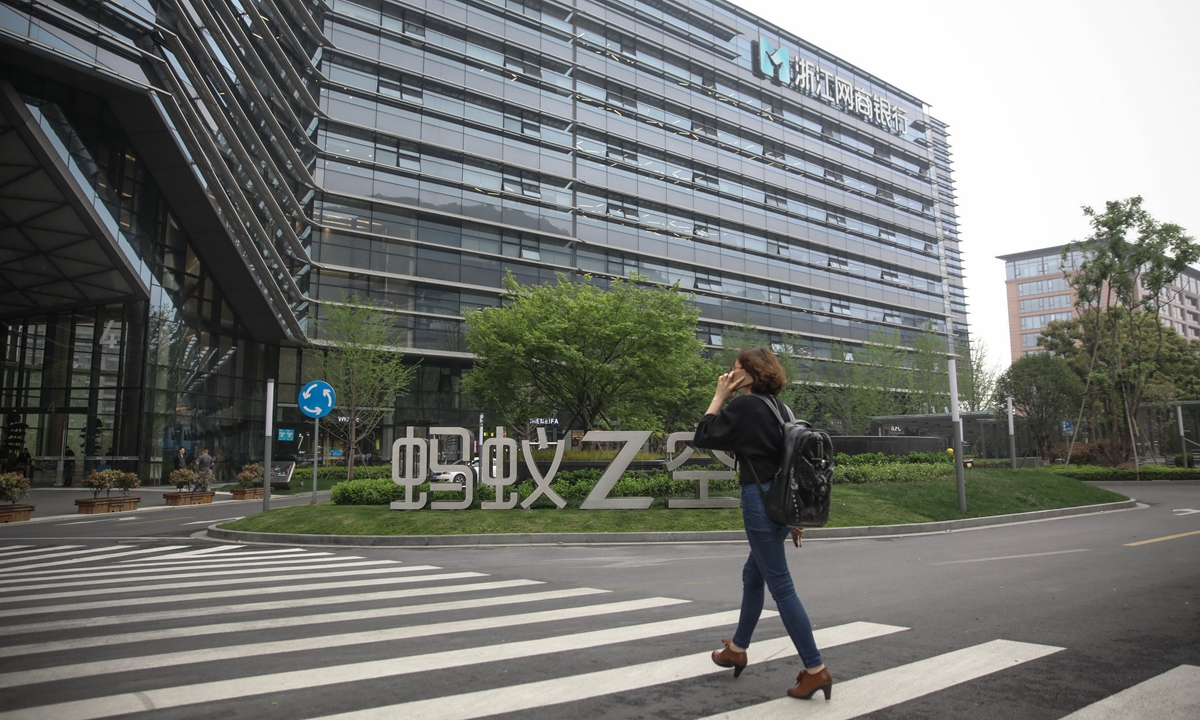Alibaba filled with gratitude, pledges to positively respond to govt rules: chairman
Source: Global Times Published: 2020/11/23 13:34:45

A person walks towards a building of Alibaba Ant Group in Hangzhou, East China's Zhejiang Province in April 2018. Souce:IC
Alibaba's chairman expressed gratitude toward regulatory governance at a conference attended by internet giants and regulators on Monday, a stark contrast to Jack Ma Yun, founder of Alibaba, who blasted global financial regulatory authorities for stifling innovation back in October.
The chairman's remarks came after a suspension of the dual listing of Ant Group, which was widely expected to become the world's biggest ever IPO.
"Alibaba is a beneficiary of China's digital economy era, and we are very grateful for this era," Zhang Yong, Alibaba chairman and CEO said at the World Internet Conference in Wuzhen, East China's Zhejiang Province, on Monday.
He said China's digital economy, which can hold its head high globally thanks to a number of excellent Internet companies and platforms that have emerged as a result of China's reform and opening-up, is due to the government's encouragement on development and innovation, and the fact that China is now the world's largest market also provides huge opportunities for companies like theirs.
Alibaba pledges to actively learn and respond to government policies and rules to build a healthier platform economy, Zhang added.
Zhang's remarks came after Chinese stock bourses announced the suspension of a planned dual listing on November 3 in Shanghai and Hong Kong by fintech giant Ant Group, which was widely expected to become the world's biggest ever IPO, until it was suspended in order to "protect the interests of consumers and investors."
One day before the suspension, China's top financial regulatory authorities summoned Jack Ma Yun, the controller of Ant Group and the chairman and president of the Chinese fintech behemoth.
The unexpected regulatory summons reminded the market of Ma's controversial remarks at the Bund Summit in Shanghai in late October.
Describing traditional banks as operating with a "pawn shop" mentality, the Alibaba founder blasted global financial regulatory authorities for stifling innovation and urged the pursuit of a system in China that accommodates development.
Ma's comments triggered much discussion, even prompting one financial newspaper under the People's Bank of China to publish an article discussing "the potential risks and regulation of large internet companies entering the financial sector," written by a veteran scholar.
The article said tech firms such as Alibaba, Tencent, Baidu and JD.com have been growing rapidly and continue to develop and penetrate the finance industry, changing the nature of China's financial services sector. But it pointed out that these firms also bring issues of "monopoly, unfair competition," and the fact that their "product and business boundaries are blurred."
One week later, the State Administration for Market Regulation published draft guidelines on an anti-monopoly act relating to the online platform economy in order to solicit public opinion, requiring all online platforms to avoid engaging in behaviors leading to illegal competition - for example by abusing their market dominance.
"The relevant government authorities are currently seeking comments on draft rules for the platform economy and we think this is very urgent and necessary," Zhang added. "Development and regulatory governance always go hand in hand, and help foster the development of platform companies, serving to increase the sustainable and healthy development of all society," Zhang added.
Posted in: INDUSTRIES,COMPANIES